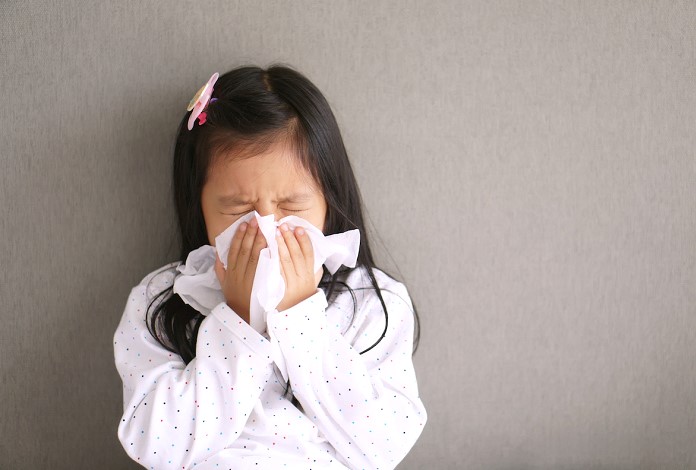As flu season continues to present itself in our lives, you might be looking for ways to keep your family healthy. This time of year, conditions are right for viruses and bacteria to spread. Having the flu is no fun, and taking care of a child with the flu is no fun, either. The flu can be life-threatening in children and can cause more hospitalizations in children than in COVID. While you can’t eliminate the risk of getting sick, there are steps you can take to lower the chances.
We’ve come up with six tips for flu prevention. Following these guidelines gives you a better chance of staying healthy this season.
1. Get Vaccinated
Number one on any list of tips for flu prevention should be getting vaccinated. The Centers for Disease Control and Prevention (CDC) recommends that everyone over six months old receive a flu vaccine yearly. The flu vaccine is updated each year to protect against the flu viruses that are most likely to circulate in that year. Vaccines are available as injections or as nasal sprays (for non-pregnant individuals ages two years to 49 years).
Because there are so many flu viruses, getting the vaccine will not guarantee you won’t get it, but it will significantly decrease your risk. It is still the best thing you can do for flu prevention. Also, there has been evidence that people who have been vaccinated but get sick with a virus that’s not in the vaccine may have less severe symptoms and recover more quickly.
Almost everyone over six months of age can be vaccinated. There are rare exceptions for individuals with specific health issues. This is something to discuss further with your doctor.
2. Wash Your Hands
It is always important to frequently and adequately wash your hands, but it becomes even more important during cold and flu season. So, one of the essential tips for flu prevention is practicing good hand hygiene.
You should wash your hands often, especially:
- Before preparing or eating food
- After using the restroom
- Before touching your eyes or mouth for any reason (like flossing or putting in contacts)
- After sneezing or coughing (also cover your nose and mouth with a tissue)
- After touching shared surfaces in the home, school, or office
- After caring for someone sick
The CDC also has guidelines on handwashing. You should use warm or cold water, both work, and soap each time you wash. Lather your hands well and scrub for at least 20 seconds, getting in between fingers and under fingernails. An excellent way to time yourself is to sing the “Happy Birthday” song twice. Use a clean towel to dry hands or let them air dry.
If you need to use hand sanitizer when you can’t wash your hands, use a variety with at least 60% alcohol.
3. Limit Contact with Sick People
If you know someone sick, keep your distance until they have recovered and are no longer contagious. People with the flu should stay home from school or work to prevent the spread of the virus. If you come into contact with someone with the flu, wash your hands thoroughly and sanitize any surfaces they may have touched.
If you are taking care of a sick child or family member, some people opt to use disposable surgical gloves and masks but whether you use these precautions is up to you. Regardless of whether you use them, wash your hands thoroughly after contact.
Also, if someone you live with or care for has the flu, do not share food with them. Ask sick individuals to dispose of their tissues. If possible, avoid sleeping in the same bed as a sick person. Only share pillows if you share a bed with a sick person.
4. Clean and Sanitize Surfaces
During flu season, when germs are spread left and right, it is vital to ensure the surfaces in your home and office are clean and sanitized, especially if they are in shared spaces. Doing a thorough wipe-down at least once daily is recommended, but you should increase it if someone is sick. You don’t need to spend much money on fancy products; standard cleaners and disinfectants are fine.
Things to make sure you clean include frequently used electronics and chargers (but be sure to be safe and only clean the outside surfaces to prevent damage to the item or yourself), light switches, countertops, and the handles of appliances like the refrigerator.
Delicate items like blankets, towels, pillows, plush toys, and clothing can host a flu virus for up to 24 hours. So, changing linens and laundering other items is essential.
5. Practice Healthy Lifestyle Habits
The healthier you are, the healthier your immune system is likely to be. Your immune system plays a crucial part in keeping you from getting sick and effectively fighting bacteria and viruses when you do get infected.
To keep your immune system in tip-top shape, ensure you and your children get enough sleep. Adults should typically aim for between 7 and 9 hours. Children have different sleep requirements depending on age, and you can find guidelines on the National Sleep Foundation site. Other things that will keep you healthy include eating a balanced diet to get critical nutrients, staying active, limiting alcohol consumption, and not smoking.
At Carithers Pediatric Group, we know how important your child’s health is, whether it’s flu season or not. Are you beginning to think that your child may have the flu? You can make an appointment by calling our Riverside office at (904) 387-6200 or our Southside office at (904) 997-0023. Existing patients can request a well-visit online through the patient portal on our website.



